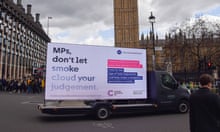The number of smokers in England has fallen to its lowest level, with just one in six adults now lighting up, according to new official figures, which also show a recent collapse in sales of cigarettes.
Just 16.9% of adults in England now smoke, according to the latest data from Public Health England. Its health experts also revealed that widespread use of e-cigarettes, nicotine patches and gum helped 500,000 smokers last year kick the habit – the highest number on record.
The statistics show that, bar two small blips, smoking prevalence has declined continuously and dramatically over the past 50 years by about two-thirds. In 1974, over 50% of men in Britain were smokers; that had fallen to just 19.1% in England in 2015. Similarly, just over 40% of women smoked back then; last year it was only 14.9%.
There are now just 7.2 million adults in England who smoke. They are far outnumbered by 14.6 million ex-smokers. It is the first time that under 17% of the population are smokers and is down from the 19.3% seen as recently as 2012.
Health campaigners said that smoking’s continuing fall in popularity is due to a combination of tough measures, such as price rises and the introduction of plain packaging, and mass media campaigns urging people to quit.
Doctors welcomed the news but pointed out that about 200 people still die prematurely every day in England as a result of heart attacks, strokes and breathing problems caused by smoking.
Prof Kevin Fenton, PHE’s national director of health and wellbeing, hailed the diminishing appeal of smoking as “amazing”. But he warned that, at 7.2 million, the number of people still lighting up regularly remained worryingly high.
“Alongside unhealthy diet, smoking is the biggest cause of preventable early death in England, accounting for over 78,000 deaths a year,” said Fenton. “Quitters will soon see they have reduced blood pressure, easier breathing and better circulation.”
PHE hopes that the figures will encourage even more people to stop using cigarettes. They have emerged just before the start of the annual Stoptober, the agency’s “mass quitting challenge”, which kicks off for the fifth time on 1 October.
Dr Mike Knapton, associate medical director at the British Heart Foundation, said: “Quitting smoking is the single best thing you can do for your heart health. By giving up smoking you’ll be dramatically reducing your chances of having a potentially deadly heart attack or stroke.”
The breakdown of smoking rates in England’s nine regions shows a north-south divide. The north-east has the highest proportion of smokers at 18.7%, closely followed by the north-west and Yorkshire and the Humber, in each of which it is 18.6%.
The south-west has the lowest percentage. Just 15.5% of adults there light up. It is 15.7% in the West Midlands, 15.9% in the south-east and 16.3% in London.
Poorer people are also much more likely to smoke than the better-off. While one in five (20.4%) of the most deprived people in England light up, just 14.3% of the least deprived in society do so.
People of Asian backgrounds are the least likely to smoke – just 10% do so. Smoking is commonest among those of mixed race, of whom 22.4% light up.
Smoking’s decline is also underscored by data from consumer analysts Nielsen showing that the number of cigarettes sold in England and Wales has plunged by 20% in the past two years.
PHE said that about 2.5 million people tried to give up smoking last year. Just over a million of them used e-cigarettes to boost their efforts, while about 700,000 were helped by nicotine replacement therapy products, such as gum and patches.
Of those 2.5 million would-be quitters, one in five succeeded – the best-ever rate. That was up from the 13.6% success rate seen as recently as 2010.
Deborah Arnott, chief executive of the campaign group Action on Smoking and Health (Ash), said: “The continuing decline in smoking prevalence is a tribute to many years when successive governments have implemented comprehensive and progressive tobacco control strategies, including tax rises, mass media campaigns, anti-smuggling measures, smoke-free laws, advertising bans, and last but not least getting rid of tobacco displays and glitzy tobacco packaging.”
However, Ash is “very concerned” that government funding for mass media campaigns – which are proven to be effective at prompting people to try to quit – has fallen sharply from almost £25m in 2009-10 to just £4m in 2016-17. Arnott called on ministers to reverse that trend, increase investment in such initiatives and publish a new tobacco control strategy, as the last one expired at the end of 2015.
Rosanna O’Connor, PHE’s director of drugs, alcohol and tobacco, said: “Marketing campaigns and price increases are especially useful in triggering quit attempts.
“But we are also influenced by the people around us. The more ex-smokers there are among your friends and family, the more likely you are to quit for good and the less likely your children are to start.”









